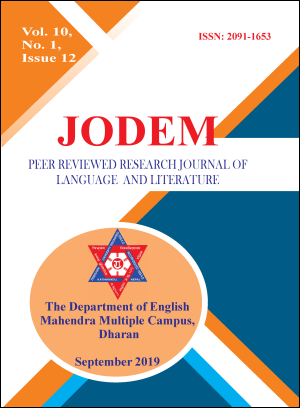Illustrating the Dominant-Subordinate Relations: A Gramscian Analysis of Vikal’s Abiral Bagdachha Indraavatee [Indravati Flows Constantly]
DOI:
https://doi.org/10.3126/jodem.v12i1.38717Keywords:
Hegemony, domination, consent, feudal cultural values, coercive agenciesAbstract
This study attempts to analyze Ramesh Vikal’s Abiral Bagdachha Indraavatee [Indravati Flows Constantly], aiming to explore the hierarchical relations between Chaturbhuj Kaji, the agent and representative ruler of feudal society, and the poor Majhi community. To analyze the text, Antonio Gramsci’s concept of hegemony has been used as a theoretical tool. He argues that the dominant class attempts to maintain their supremacy over subordinate groups in two ways – by winning spontaneous consent and by exercising coercive agencies such as police, military, courts and prisons; and using means of violence and terror. Consequently, pains and sufferings perpetuate in everyday lives of subordinate people. For instance, in the text, the village head Kaji and his son dominate the poor Majhi people, but they do not realize the oppression or fail to revolt against domination of the Kaji family because of the cultural hegemony and lack of class alliances. As a result, they go through the sufferings like poverty, physical tortures, imprisonment, kidnaped and rape and so on. This study gives insights to see how the evils and vices of feudal system degrade the lives of the Majhi people in particular and the entire humanity in general.
Downloads
Downloads
Published
How to Cite
Issue
Section
License
© Department of English, Mahendra Multiple Campus, Dharan, Nepal

